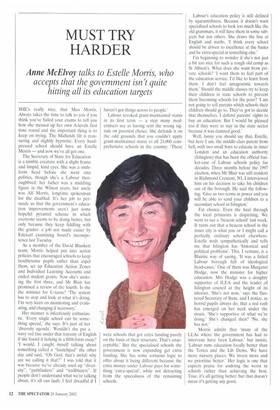MUST TRY HARDER
Anne McElvoy talks to Estelle Morris, who
accepts that the government isn't quite hitting all its education targets
SHE's really nice, that Miss Morris. Always takes the time to talk to you if you think you've failed your exams to tell you how she messed up her own A-levels first time round and the important thing is to keep on trying. The Midlands lilt is reassuring and slightly hypnotic. Every hardpressed school should have an Estelle Morris — and now we've all got one.
The Secretary of State for Education is a nimble creature with a slight frame and limpid, kind eyes. She was a sixthform head before she went into politics, though she's a Labour thoroughbred: her father was a middling figure in the Wilson years, her uncle was Alf Morris, longtime spokesman for the disabled. It's her job to persuade us that the government's education improvements aren't just some hopeful pyramid scheme in which everyone seems to be doing better, but only because they keep fiddling with the grades: a job not made easier by Edexcel examining board's incompetence last Tuesday.
As a member of the David Blunkett team, Morris helped put into action policies that encouraged schools to keep troublesome pupils rather than expel them, set up Education Action Zones and Individual Learning Accounts and ended student grants. Now she's undoing the first three, and Mr Blair has promised a review of the fourth. Is she the minister for U-turns? 'The system has to stop and look at what it's doing. I'm very keen on monitoring and evaluating, and changing if necessary.'
Her manner is infectiously enthusiastic. 'Every single school can be something special,' she says. It's part of her 'diversity agenda'. Wouldn't she put a wavy red line under that travesty of English if she found it lurking in a fifth-form essay? 'I would. I caught myself talking about something called a launchpad" the other day and said, "Oh God, that's awful; why are we calling it that?" I was told that it was because we've already used up "diversity", "pathfinders" and "trailblazers". If people don't understand what we're talking about, it's all our fault. I feel dreadful if I haven't got things across to people.'
Labour revoked grant-maintained status in its first term — a step many modernisers see as having sent the wrong signals on parental choice. She defends it on the odd grounds that you couldn't apply grant-maintained status to all 24,000 comprehensive schools in the country. 'These were schools that got extra funding purely on the basis of their structure. That's unacceptable.' But the specialised schools the government is now expanding get extra funding. She has some tortuous logic to offer about it being different because the extra money under Labour pays for something 'extra-special', while not detracting from the specialness of the remaining schools. Labour's education policy is still defined by squeamishness. Because it doesn't want specialised schools to look too much like the old grammars, it will have them in some subjects but not others. She draws the line at English and maths. 'I think every school should be driven to excellence at the basics and be extra-special at something else.'
I'm beginning to wonder if she's not just a bit too nice for such a rough old comp as St Albion's. What does she want from private schools? 'I want them to feel part of the education service. I'd like to learn from them. I don't feel antagonistic towards them.' Should the middle classes try to keep their children in state schools to prevent them becoming schools for the poor? 'I am not going to tell parents which schools their children should go to. They've got to decide that themselves. I defend parents' rights to buy an education. But I would be pleased too if they were to stay in the state sector because it was damned good.'
Well, funny you should say that, Estelle, but here I am, the middle-class parent from hell, with two small boys to educate in inner London and an education authority (Islington) that has been the official basket-case of Labour schools policy for decades. Three months before the 1997 election, when Mr Blair was still resident in Richmond Crescent, Ni, I interviewed him on his decision to take his children out of the borough. He said the following: 'Give us two terms in power and you will be able to send your children to a secondary school in Islington.'
Fat chance. Even the haul through the local primaries is dispiriting. We went to see a 'beacon school' last week. It turns out that a beacon school in the inner city is what you or I might call a perfectly ordinary school elsewhere. Estelle nods sympathetically and tells me that Islington has 'historical and political problems'. This, I venture, is a Blairite way of saying, 'It was a failed Labour borough full of ideological head-eases.' One of them was Margaret Hodge, now the minister for higher education. Mrs Hodge was a doughty supporter of ILEA and the leader of Islington council at the height of its idiocies. 'She's not now,' says the flustered Secretary of State, and I notice, as horrid pupils always do, that a red rash has emerged on her neck under the strain. 'She's supportive of what we're doing.' She's changed then? 'No, she has not.'
Morris admits that 'many of the LEAs where the government has had to intervene have been Labour,' but insists. 'Labour runs education locally better than the Tories and the Lib Dems. We have more nursery places. We invest more and we prioritise better.' Her logic is one that expects praise for undoing the worst in schools rather than achieving the best. True, it's all getting better; but that doesn't mean it's getting any good.


















































































 Previous page
Previous page